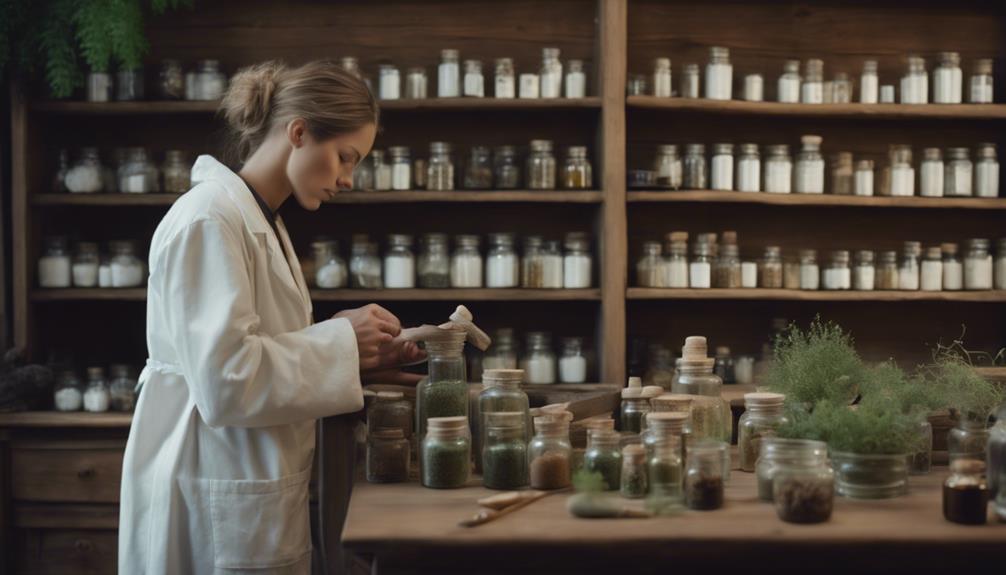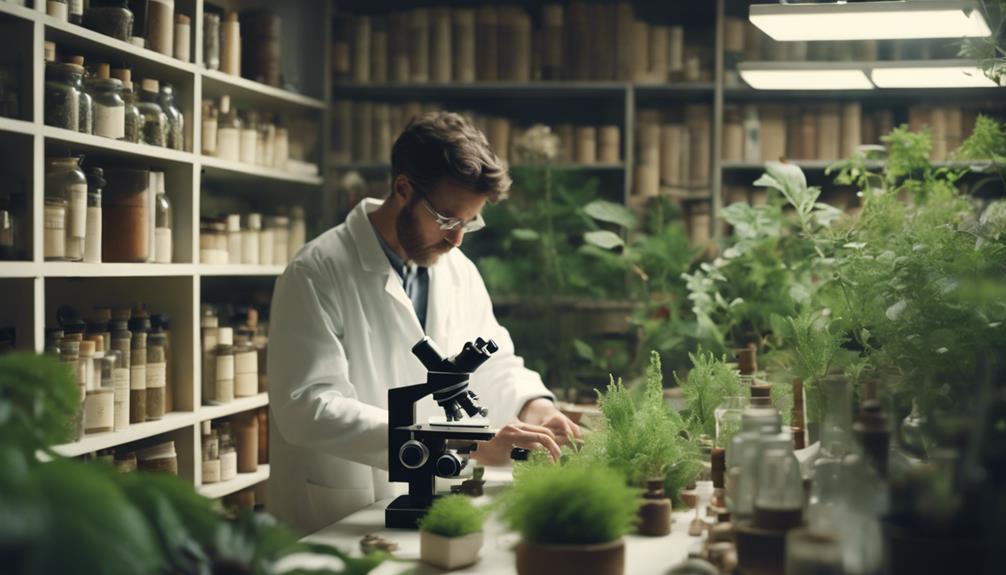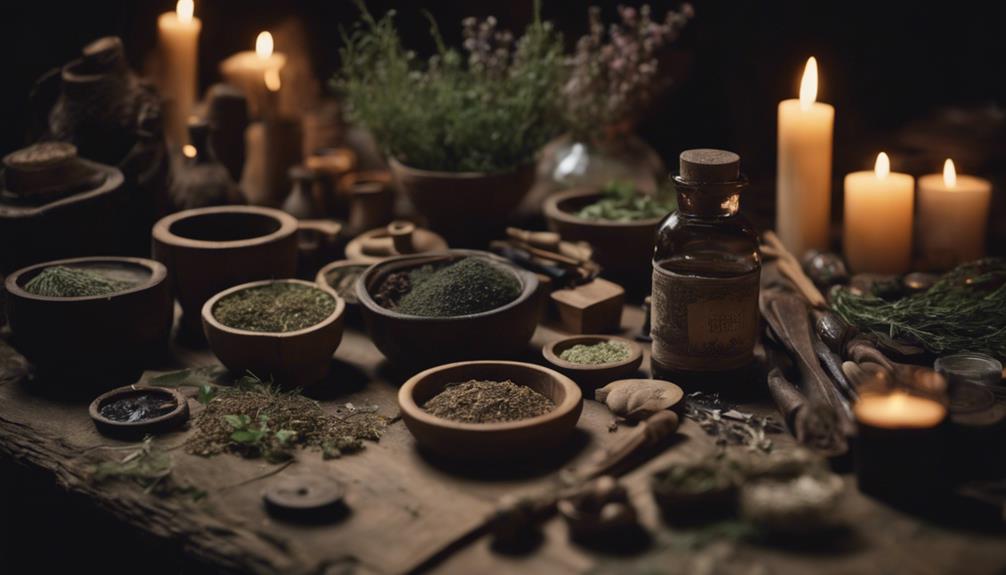With a herbalism degree, we can pursue a wide range of careers, from clinical practice and entrepreneurship to education and research, with the global herbal supplements market projected to reach $86.74 billion by 2025, offering a vast and growing landscape of opportunities. We can become clinical herbalists, creating customized remedies, or herbal educators, teaching about herbs. We might start herbal product businesses, specialize in a niche, or focus on business development. We can also explore opportunities in herbal writing, farming, and wildcrafting, or contribute to research and education in the field. There's even more to discover about the many paths available to us.
Key Takeaways
• Pursue clinical practice, entrepreneurship, education, and research careers with a herbalism degree, offering diverse opportunities.
• Work as a clinical herbalist, educator, or entrepreneur, creating customized remedies, teaching about herbs, or starting herbal product businesses.
• Specialize in a niche, such as herbal product development, herbalism education, or herbal writing, to increase earning potential.
• Capitalize on the growing demand for herbal products and services, potentially earning $20 to $50 per hour or more.
• Explore opportunities in herbal farming, wildcrafting, and botanical research, cultivating a deeper connection with nature and traditional healing practices.
Herbalist Career Opportunities
We can pursue a variety of fulfilling careers in herbalism, from clinical practice to entrepreneurship. As herbalists, we've numerous career opportunities that allow us to utilize our knowledge and skills in different ways.
We can work as clinical herbalists, providing personalized health consultations and creating customized herbal remedies for clients. Alternatively, we can share our knowledge by becoming herbal educators, teaching others about the benefits and uses of herbs. Some of us might prefer to focus on the business side, starting our own herbal product businesses or growing medicinal herbs for sale.
Whatever path we choose, we can specialize in a niche within herbalism to differentiate ourselves and increase our earning potential. With herbal education and experience, our career choices are vast, and our earning potential is influenced by our skills, location, and career choices.
As herbalists, we've the flexibility to forge our own paths and create fulfilling careers that align with our passions and strengths.
Clinical Herbalism Careers

As we explore the many paths available to us in herbalism, clinical herbalism stands out as a particularly rewarding career path, offering a unique opportunity to work one-on-one with clients and address their specific health concerns.
As clinical herbalists, we can earn a lucrative income, with rates ranging from $50 to $100+ per hour. Many of us choose to start our own private practices or mobile clinics, providing herbal remedies to those in need. Some clinical herbalists specialize in serving under-served communities or focusing on specific health conditions, such as women's health or pediatrics.
We may also combine our training with community clinics or herbal pop-up events to reach a broader audience. The opportunities for clinical herbalists are vast, and we can get creative with our practices, offering unique services to clients.
As professional herbalists, we can establish our own herbal companies or partner with existing ones, expanding our reach and impact. With a herbalism degree, we can build a fulfilling career in clinical herbalism, making a real difference in people's lives.
Herbal Product Development

As we explore the domain of herbal product development, we're going to examine the essential aspects of formulation strategies and botanical extracts analysis.
We'll discuss how these points are vital in creating effective and safe herbal products that meet the highest standards of quality.
Formulation Strategies
When developing herbal products, selecting the right combination of herbs and determining the most effective extraction methods are crucial formulation strategies that can make or break a product's success. As herbalism professionals, we recognize that creating a high-quality herbal product involves more than just throwing a few herbs together. We need to carefully assess the properties of each herb, how they interact with each other, and how they'll be extracted to guarantee maximum efficacy.
Here are some key considerations in our formulation strategies:
- Herbal interactions: We need to evaluate how different herbs interact with each other and with other ingredients in the product.
- Extraction methods: We must select the most effective extraction method for each herb to ensure top potency and quality.
- Quality control: We implement strict quality control measures to make certain our products meet the highest standards of safety and efficacy.
Botanical Extracts Analysis
We assess the chemical composition of plants to identify active compounds in herbal products, guaranteeing the potency and efficacy of our remedies. As herbalists, we comprehend that analyzing botanical extracts is vital in herbal product development. This involves expertise in extraction methods and quality control to secure the production of high-quality herbal products.
Botanical extracts analysis helps us pinpoint the active compounds in herbal remedies, ensuring their potency and efficacy. By grasping the chemical composition of plants, we can create effective herbal formulations. With knowledge of botanical extracts analysis, we can develop innovative herbal products that meet the needs of our customers. This expertise allows us to create remedies that are tailored to specific health concerns, providing our customers with effective solutions.
Herbalism Education and Research

As we explore the domain of herbalism education and research, we're excited to examine the critical components that drive this field forward.
We'll investigate the development of herbal medicine, which involves the creation of novel herbal remedies, as well as the rigorous research methods employed in botanical research.
Herbal Medicine Development
Through rigorous research and development, we're pushing the boundaries of herbal medicine, creating innovative products that address a wide range of health conditions. As herbalism degree holders, we're equipped to contribute to the development of new herbal remedies through clinical trials and scientific studies. Our education in herbalism provides us with the knowledge and skills to create effective herbal medicine products that promote natural healing practices.
Here are three ways we're advancing herbal medicine development:
- Studying efficacy and safety: We're conducting research to guarantee the safety and effectiveness of herbal remedies, providing reliable data for healthcare professionals and consumers.
- Developing innovative products: We're creating new herbal medicine products that address specific health conditions, expanding treatment options for patients.
- Advancing natural healing practices: Our work in herbal medicine development is promoting the use of natural remedies, providing a holistic approach to healthcare.
Botanical Research Methods
Our understanding of botanical research methods is vital in herbalism education and research, as it enables us to scientifically investigate the properties and interactions of medicinal plants.
We explore plant identification, studying the characteristics of various species to guarantee accurate classification. Extraction techniques are also essential, as they impact the quality and efficacy of herbal products. By analyzing plant constituents, we can pinpoint the active compounds responsible for therapeutic effects.
Fieldwork allows us to observe plants in their natural habitats, while laboratory analysis enables us to examine their chemical composition. Through botanical research methods, we can validate traditional uses of herbal remedies and develop evidence-based practices.
By understanding these methods, we can contribute to the development of safe and effective herbal products. As herbalists, it's crucial we grasp these concepts to advance the field of herbalism and provide high-quality care to our patients.
Herbal Business and Entrepreneurship

We can capitalize on the growing demand for herbal products and services by starting our own business, potentially earning $20 to $50 per hour based on our marketing savvy and niche expertise. With a herbalism degree, we can explore entrepreneurial opportunities in creating unique herbal products or services that stand out in the market.
Here are some ways we can succeed in the herbal business:
- Niche specialization: Focus on a specific area of herbalism, such as herbal remedies for pets or herbal skincare, to attract a dedicated customer base.
- Tailored products: Create herbal products tailored to specific groups or conditions, increasing their market appeal.
- Networking opportunities: Connect with support groups and healthcare providers to promote our business and grow our customer base.
Herbal Writing and Communications

As we explore the many applications of our herbalism degree, we're now turning our attention to the art of herbal writing and communications, where we can leverage our knowledge to educate and inspire others about the power of medicinal herbs.
Through herbal writing, we can create engaging content about plants, herbal remedies, and holistic health practices that resonate with a wide audience. As herbal writers, we specialize in crafting informative articles, books, blogs, and educational materials that showcase the benefits and uses of herbal medicine.
By collaborating with herbalists, researchers, and health experts, we contribute to the growing body of knowledge on herbal medicine and natural healing. Our writing plays an important role in educating the public about the benefits and uses of medicinal herbs, dispelling misconceptions and promoting a deeper understanding of holistic health practices.
Herbal Farming and Wildcrafting

Digging into the world of herbalism, we cultivate our connection with nature through herbal farming and wildcrafting, two practices that bring us closer to the source of medicinal herbs. These practices allow us to grow and harvest medicinal herbs, connecting us with the natural world and traditional healing practices.
Here are three key aspects of herbal farming and wildcrafting:
- Sustainable harvesting: Wildcrafters must follow sustainable harvesting practices to guarantee the long-term health of wild plant populations, securing that future generations can continue to benefit from these medicinal herbs.
- Specialized cultivation: Herbal farmers can specialize in growing specific medicinal herbs to meet market demands and create unique products, catering to the needs of herbalists and other businesses.
- Connection to nature: Both herbal farming and wildcrafting offer opportunities for herbalists to connect with plants, nature, and traditional healing practices, fostering a deeper appreciation for the natural world.
Through herbal farming and wildcrafting, we can develop a deeper understanding of medicinal herbs, their properties, and their role in traditional healing practices. These practices also provide opportunities for herbalists to contribute to the development of new herbal products and services, further expanding the reach of herbalism.
Frequently Asked Questions
Can You Make a Career Out of Herbalism?
We can confidently say that yes, we can make a career out of herbalism. With a growing demand for natural remedies and wellness practices, the job market is expanding.
From clinical herbalists earning $50 to $100+ per hour to herbal educators making $30 to $120 per hour, the opportunities are vast. We can specialize in a niche, work in various fields, and earn a decent living, with annual salaries ranging from $20,000 to $120,000.
Do Herbalists Make a Lot of Money?
We often wonder, do herbalists really rake in the dough? The answer is, it depends.
While some herbalists can earn a substantial income, others may not be as lucrative. Clinical herbalists, for instance, can earn $50 to $100+ per hour.
Herbal educators and business owners can also earn a decent living, with hourly rates ranging from $30 to $120.
However, growers of medicinal herbs may earn a more modest $15 to $30 per hour.
What Profession Uses Herbalism?
We can pursue various professions that utilize herbalism, such as:
- clinical herbalists
- herbal educators
- growers of medicinal herbs
- herbal product business owners
Additionally, we can work as:
- herbal artists
- marketers
- pharmacists
- retail workers
- botanists
- researchers
Some of us might become:
- chefs with an herbal focus
- homesteaders
- teachers
- consultants
- herbal activists
The possibilities are diverse, and our skills and interests can guide us towards a fulfilling profession that incorporates herbalism.
Is There a Demand for Herbalists?
We're excited to report that the demand for herbalists is on the rise, with the global herbal medicine market projected to reach $1.5 billion by 2025.
This growth is driven by the increasing popularity of natural remedies and alternative healing practices. As a result, herbalists can find employment opportunities in various settings, from private practice to research and development.
With the industry's continued growth, we're confident that herbalists will play an essential role in shaping the future of modern wellness practices.
Conclusion
As we've explored the diverse career paths available to herbalism degree holders, we're reminded that our passion for plants can manifest in many ways.
We can heal as clinical herbalists, innovate as product developers, educate as instructors, or cultivate as farmers.
We can write about, research, or advocate for herbalism. Whatever our path, we're united by a shared devotion to the healing power of plants.










